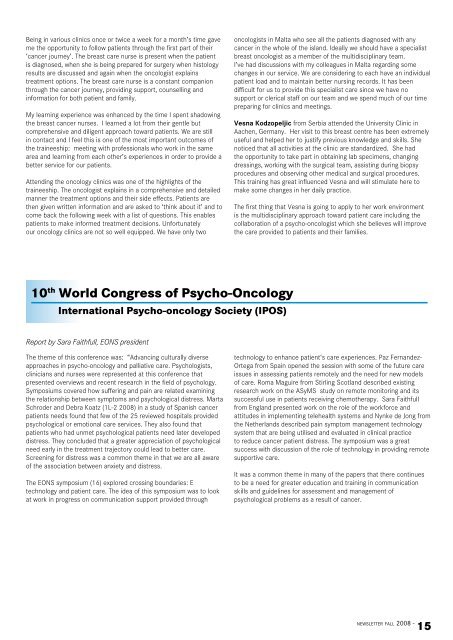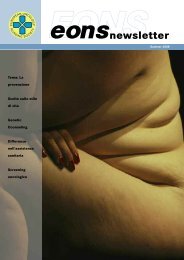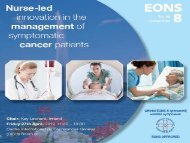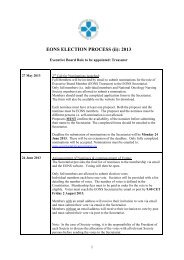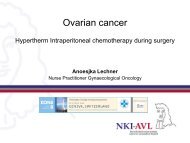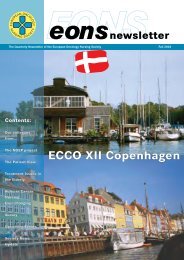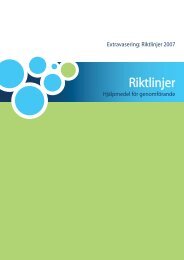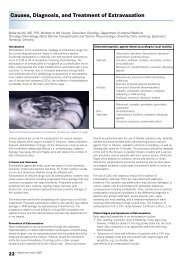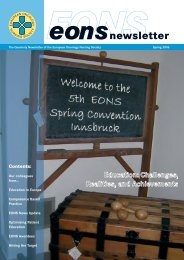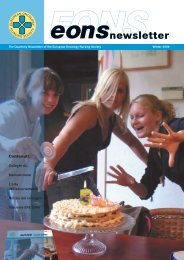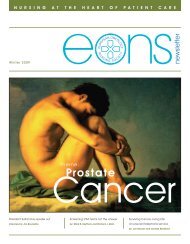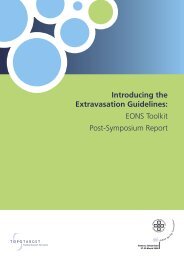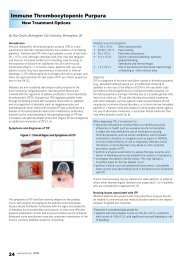EONS, Eusoma, ESSO Training ProgrammeReport from <strong>the</strong> participantsJan Foubert, EONS representative on this Training Programme.Regular readers of <strong>the</strong> EONS Newsletter may recall an articlepublished in <strong>the</strong> Winter 2007 issue which announced <strong>the</strong> recipientsof a traineeship supported by Eusoma, EONS, and ESSO. Theaim of this educational initiative is to train specialist health careprofessionals to better deal with patients with breast cancer.Following a very successful call for applications for <strong>the</strong> traineeships,five EONS members were chosen to participate in a one-monthvisitation to a <strong>European</strong> breast care center. As you will read below,both recipients made <strong>the</strong> most of <strong>the</strong> opportunity to learn more aboutnursing care of <strong>the</strong> patient with breast cancer and to extend <strong>the</strong>irnetwork of <strong>European</strong> colleagues.Lara Kaligaric from Slovenia was selected to attend a clinicaltraining programme in <strong>the</strong> Senology Department, FondazioneSalvatore Maugeri, Pavia, Italy, here follows her impressions of <strong>the</strong>traineeship:Although <strong>the</strong> approach to care was multidisciplinary on this breastunit, most of my traineeship was concentrated on interaction with <strong>the</strong>nursing staff. I had <strong>the</strong> opportunity to observe different procedureswhile working on <strong>the</strong> unit as well as observing procedures in <strong>the</strong>operating room. I found <strong>the</strong> experience of assisting in <strong>the</strong> operatingroom particularly interesting as I had never before done this type ofnursing.Experiencing <strong>the</strong> interaction and collaboration between oncologistsand plastic surgeons was new for me as plastic surgeons are not partof <strong>the</strong> oncology team at my ‘home’ institution. I also gained newknowledge by participating in multidisciplinary sessions where patientcases and treatment options were discussed.Although I am sure that I have developed new competencies throughmy experience, <strong>the</strong> one-month duration of my traineeship was tooshort for <strong>the</strong>se newly acquired skills to really show <strong>the</strong>mselves. Ihave learned some new aspects of cancer care that I will certainly beable to use in one form or ano<strong>the</strong>r when I return to my place of work.These are:• The importance of developing a relationship with <strong>the</strong> patient priorto surgery;• Different patients have different needs: some want to knoweverything about <strong>the</strong>ir illness while o<strong>the</strong>rs just want to have surgeryand get on with <strong>the</strong>ir lives;• Sometimes <strong>the</strong> best nursing care is to just be quiet and listen to<strong>the</strong> patient.The training was a good experience however what I observed wasnot so very different from <strong>the</strong> situation on my ‘home unit’. Beforeundertaking <strong>the</strong> training I was very motivated to initiate change andstill am! On <strong>the</strong> unit where I work we care for patients with all typesof cancers so it will be somewhat difficult to implement all of what Iexperienced. I would like to eventually work in an outpatient settingwith women who have different stages of breast cancer undergoingdifferent types of treatment.Marjia Adamovic from Serbia did her traineeship at <strong>the</strong> CancerInstitute-Antoni van Leeuwenhoek in AmsterdamMy one-month traineeship in a specialized, high-standard institutionlike The Ne<strong>the</strong>rlands Cancer Institute-Antoni van Leeuwenhoek(NKI-AVL) in Amsterdam was a great experience for me that widenedmy knowledge. I had an opportunity to visit <strong>the</strong> operating rooms, <strong>the</strong>internal medicine department, <strong>the</strong> outpatient clinic for chemo<strong>the</strong>rapy,<strong>the</strong> radiology department and <strong>the</strong> department for creative <strong>the</strong>rapy.My attendance at <strong>the</strong> interdisciplinary meetings was especiallyrewarding. Contact with patients really increased my understandingof <strong>the</strong> role of cancer nurses.Working in <strong>the</strong> medication preparation room, which was speciallydesigned to protect nurses and pharmacists from contact withhazardous agents, taught me a lot about <strong>the</strong> proper handling ofchemo<strong>the</strong>rapy agents. That is something we do not have at <strong>the</strong>Institute for <strong>Oncology</strong> and Radiology of Serbia.In everyday work with kind and helpful colleagues, I gained insightinto new protocols to treat breast cancer and o<strong>the</strong>r malignancies.I also saw a new generation digital mammography in practice andstereotactic biopsy used as a diagnostic procedure.What I found most intriguing was <strong>the</strong> organization of <strong>the</strong> institutewhich is centered around <strong>the</strong> patient and many procedures, forexample MRI, are performed within one day. I also was surprisedthat breast reconstruction is paid by <strong>the</strong> social insurance fund. Theaccommodations for patients are spacious and brightly decoratedand <strong>the</strong>re are meditation rooms for both Christians and Muslims.Patients and <strong>the</strong>ir families can easily access information which isavailable in leaflets, books, internet and open phone lines.Workshops and creative <strong>the</strong>rapy play a big role in <strong>the</strong> psychologicalaspect of patient care. I met an elderly lady who was receivingchemo<strong>the</strong>rapy and happily chatting about a necklace she was makingin creative <strong>the</strong>rapy. Concerts are held every month for patients.All <strong>the</strong>se experiences left a big impression on me and I hope that oneday we will have <strong>the</strong> facilities and resources that I saw at <strong>the</strong> CancerInstitute-Antoni van Leeuwenhoek at my institute. Although wecannot offer patients <strong>the</strong> same treatment as offered in Amsterdam,we give our best, we use what we have, and we try to makeeverything easier for <strong>the</strong>m.Elizabeth Vella from Malta went to Burney Breast Unit in WhistonHospital in Prescott Merseyside.My one-month traineeship was positive and an excellent learningexperience. Although I had had an opportunity to attend <strong>the</strong> course‘Care of <strong>the</strong> Patient with Breast Cancer’ at <strong>the</strong> Royal MarsdenHospital in London, actually experiencing first-hand how things aredone and being present as part of <strong>the</strong> team on <strong>the</strong> Burney Unit was amuch more enriching experience.Burney Breast Unit is situated within Whiston Hospital and coversa population of 360,000. The breast service is staffed by a team ofdedicated clinicians and specialist nurses. The team detects andtreats over 200 new cases of cancer each year. I had <strong>the</strong> opportunityto attend a variety of services offered by <strong>the</strong> clinic, such as rapidaccess, non-urgent, follow-up and clinical trials clinics. I alsoparticipated during surgical procedures, in <strong>the</strong> chemo<strong>the</strong>rapy unit, atoncology consultations, and during reconstructive/plastic surgeonconsultations.Mr. R Audisio under whose patronage I was entrusted, kindly invitedme to attend clinic sessions. Although my main interest was toobserve, share and work with <strong>the</strong> specialist breast care nurses,watching surgical procedures which have not yet been introduced inMalta, was interesting.- newsletter fall 200814
Being in various clinics once or twice a week for a month’s time gaveme <strong>the</strong> opportunity to follow patients through <strong>the</strong> first part of <strong>the</strong>ir‘cancer journey’. The breast care nurse is present when <strong>the</strong> patientis diagnosed, when she is being prepared for surgery when histologyresults are discussed and again when <strong>the</strong> oncologist explainstreatment options. The breast care nurse is a constant companionthrough <strong>the</strong> cancer journey, providing support, counselling andinformation for both patient and family.My learning experience was enhanced by <strong>the</strong> time I spent shadowing<strong>the</strong> breast cancer nurses. I learned a lot from <strong>the</strong>ir gentle butcomprehensive and diligent approach toward patients. We are stillin contact and I feel this is one of <strong>the</strong> most important outcomes of<strong>the</strong> traineeship: meeting with professionals who work in <strong>the</strong> samearea and learning from each o<strong>the</strong>r’s experiences in order to provide abetter service for our patients.Attending <strong>the</strong> oncology clinics was one of <strong>the</strong> highlights of <strong>the</strong>traineeship. The oncologist explains in a comprehensive and detailedmanner <strong>the</strong> treatment options and <strong>the</strong>ir side effects. Patients are<strong>the</strong>n given written information and are asked to ‘think about it’ and tocome back <strong>the</strong> following week with a list of questions. This enablespatients to make informed treatment decisions. Unfortunatelyour oncology clinics are not so well equipped. We have only twooncologists in Malta who see all <strong>the</strong> patients diagnosed with anycancer in <strong>the</strong> whole of <strong>the</strong> island. Ideally we should have a specialistbreast oncologist as a member of <strong>the</strong> multidisciplinary team.I’ve had discussions with my colleagues in Malta regarding somechanges in our service. We are considering to each have an individualpatient load and to maintain better nursing records. It has beendifficult for us to provide this specialist care since we have nosupport or clerical staff on our team and we spend much of our timepreparing for clinics and meetings.Vesna Kodzopeljic from Serbia attended <strong>the</strong> University Clinic inAachen, Germany. Her visit to this breast centre has been extremelyuseful and helped her to justify previous knowledge and skills. Shenoticed that all activities at <strong>the</strong> clinic are standardized. She had<strong>the</strong> opportunity to take part in obtaining lab specimens, changingdressings, working with <strong>the</strong> surgical team, assisting during biopsyprocedures and observing o<strong>the</strong>r medical and surgical procedures.This training has great influenced Vesna and will stimulate here tomake some changes in her daily practice.The first thing that Vesna is going to apply to her work environmentis <strong>the</strong> multidisciplinary approach toward patient care including <strong>the</strong>collaboration of a psycho-oncologist which she believes will improve<strong>the</strong> care provided to patients and <strong>the</strong>ir families.10 th World Congress of Psycho-<strong>Oncology</strong>International Psycho-oncology <strong>Society</strong> (IPOS)Report by Sara Faithfull, EONS presidentThe <strong>the</strong>me of this conference was: “Advancing culturally diverseapproaches in psycho-oncology and palliative care. Psychologists,clinicians and nurses were represented at this conference thatpresented overviews and recent research in <strong>the</strong> field of psychology.Symposiums covered how suffering and pain are related examining<strong>the</strong> relationship between symptoms and psychological distress. MartaSchroder and Debra Koatz (1L-2 2008) in a study of Spanish cancerpatients needs found that few of <strong>the</strong> 25 reviewed hospitals providedpsychological or emotional care services. They also found thatpatients who had unmet psychological patients need later developeddistress. They concluded that a greater appreciation of psychologicalneed early in <strong>the</strong> treatment trajectory could lead to better care.Screening for distress was a common <strong>the</strong>me in that we are all awareof <strong>the</strong> association between anxiety and distress.The EONS symposium (16) explored crossing boundaries: Etechnology and patient care. The idea of this symposium was to lookat work in progress on communication support provided throughtechnology to enhance patient‘s care experiences. Paz Fernandez-Ortega from Spain opened <strong>the</strong> session with some of <strong>the</strong> future careissues in assessing patients remotely and <strong>the</strong> need for new modelsof care. Roma Maguire from Stirling Scotland described existingresearch work on <strong>the</strong> ASyMS study on remote monitoring and itssuccessful use in patients receiving chemo<strong>the</strong>rapy. Sara Faithfullfrom England presented work on <strong>the</strong> role of <strong>the</strong> workforce andattitudes in implementing telehealth systems and Nynke de Jong from<strong>the</strong> Ne<strong>the</strong>rlands described pain symptom management technologysystem that are being utilised and evaluated in clinical practiceto reduce cancer patient distress. The symposium was a greatsuccess with discussion of <strong>the</strong> role of technology in providing remotesupportive care.It was a common <strong>the</strong>me in many of <strong>the</strong> papers that <strong>the</strong>re continuesto be a need for greater education and training in communicationskills and guidelines for assessment and management ofpsychological problems as a result of cancer.newsletter fall 2008 -15


